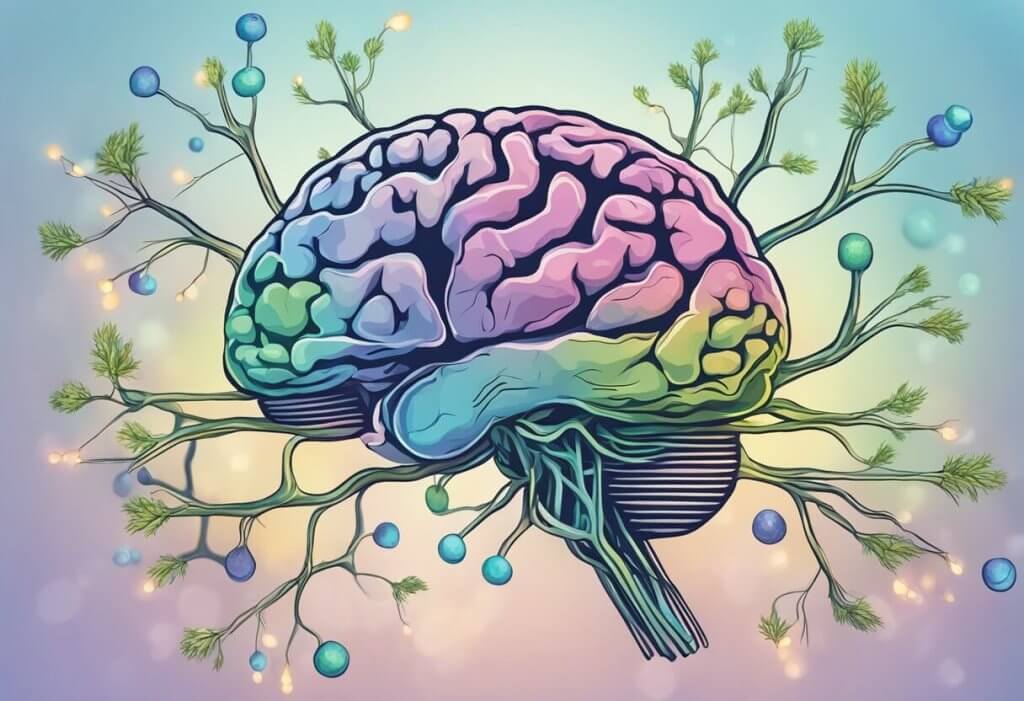Exploring Potential Benefits
Disclaimer: The anecdotal benefits of CBD mentioned on this website are based on preliminary research and individual user experiences. All information presented here is not meant to substitute for or replace information from health care practitioners. Please click here for our full disclaimer, including side effects, FTC position, etc.
For those affected by Huntington’s disease, the search for effective treatments and symptom management can be a challenging journey, often leaving individuals and their loved ones feeling frustrated and hopeless.

Huntington’s disease, a rare and devastating neurodegenerative disorder, affects not only the individual diagnosed but also their entire support system.
As the disease progressively impairs physical, cognitive, and emotional functioning, patients and caregivers alike find themselves seeking alternatives to conventional therapies, yearning for a glimmer of hope in the face of this relentless condition.
In recent years, a growing body of research has shed light on the potential of CBD, or cannabidiol, as a promising avenue for managing the complex symptoms associated with Huntington’s disease. With its ability to interact with the body’s endocannabinoid system and its potential neuropsychiatric benefits, CBD has captured the attention of the Huntington’s community, offering a ray of hope for those navigating this challenging journey.
As we delve into the world of CBD and its potential applications in Huntington’s disease, we invite you to explore the current research, personal experiences, and cautious optimism surrounding this natural compound.
Key Takeaways
- CBD is explored for potential symptom management in Huntington’s Disease.
- The neuroprotective qualities of CBD are of interest in the context of neurological disorders.
- CBD’s interaction with the endocannabinoid system suggests possible therapeutic benefits.
Understanding Huntington’s Disease and CBD

Exploring the intersection of Huntington’s Disease and CBD reveals potential therapeutic avenues. CBD, with its neuroprotective qualities, may offer some relief for those facing the neurodegeneration and symptoms characteristic of this condition.
Overview of Huntington’s Disease
Huntington’s Disease (HD) is a hereditary neurodegenerative disorder that stems from the progressive degeneration of nerve cells in the basal ganglia of the brain. It is known for causing chorea—involuntary, jerky movements—and a suite of other symptoms such as cognitive decline, irritability, and apathy. Essential neurotransmitters like dopamine and GABA are affected, hampering the nervous system’s functioning.
The disease results from a mutation in the huntingtin gene, which leads to abnormal protein formations that are toxic to brain cells. As HD progresses, patients typically experience an extensive range of symptoms, including:
- Uncontrolled movements
- Emotional changes
- The decrease in cognitive abilities
The Science of CBD
Cannabidiol (CBD), a non-psychotropic compound found in cannabis, has garnered attention for its potential therapeutic uses, particularly due to its neuroprotective, antioxidant, and anti-inflammatory properties.
Unlike its counterpart, delta-9-tetrahydrocannabinol (THC), CBD does not produce euphoria or intoxication, often making it a preferred option for medical use.
CBD interacts with the endocannabinoid system, particularly the CB1 receptors in the brain, allowing it to modulate the release of neurotransmitters and support homeostasis.
While research is still in the nascent stages, some studies suggest CBD’s efficacy in reducing neuroinflammation and mitigating neuronal damage.
Clinical trials examining the pharmacokinetics of oral CBD and CBD oil show some promise.
For instance, in a comprehensive review, CBD is posited as a burgeoning option that might address some of the neurobiological underpinnings of Huntington’s Disease.
Further research is imperative, but the anti-inflammatory potential of CBD is a beacon of hope for symptom management in neurodegenerative disorders like HD.
“CBD is a very promising compound because it is anti-inflammatory, neuroprotective and antioxidant, so it helps neurons to survive. We have evidence that it may be beneficial in Huntington’s disease to improve symptoms and disease progression.”
Dr. Javier Fernández Ruiz, Professor of Biochemistry and Molecular Biology at Complutense University
CBD for Symptom Management in Huntington’s Disease

Exploring the use of CBD for symptom relief in Huntington’s Disease (HD) reveals its potential impact on movement disorders and neuropsychiatric symptoms. As research evolves, the scientific community is closely monitoring its symptomatic efficacy and safety profile.
Addressing Movement Disorders and Neuropsychiatric Symptoms
CBD has been explored as a treatment to alleviate movement disorders such as tremors, chorea, and dystonia commonly associated with HD. These involuntary movements can be distressing, impacting balance and cognition and eroding quality of life.
Some studies suggest CBD’s neuroprotective and anxiolytic properties may benefit patients by potentially reducing movement severity and neuropsychiatric issues, including depression, obsessive-compulsive disorder, and other psychiatric disorders associated with HD.
Evaluating Clinical Trials and Research
Various clinical trials have assessed CBD’s effects on HD. Most notably, a double-blind, placebo-controlled study did not find CBD to significantly improve chorea or other symptoms at a dose of 10 mg/kg.
However, research continues as case studies have raised questions about dosages and the long-term safety and side effects, including nausea and vomiting. Researchers aim to refine their understanding of CBD’s therapeutic benefits and limitations.
Potential Therapeutic Benefits and Limitations
While comprehensive data is lacking, preliminary findings indicate CBD’s antipsychotic, antidepressant, and anxiolytic effects may aid in managing HD symptoms like changes in behavior, depression, and sleep disturbances.
The potential for CBD to offer symptomatic relief shows promise, yet it is crucial to discuss its use with healthcare providers, considering existing medications and the overall management of the disease.
Promising study: A double-blind, randomized controlled trial evaluated the effects of 10 mg/kg/day oral CBD in patients with Huntington’s disease. The study found that CBD was safe and well-tolerated. While there was no significant improvement in motor scores, CBD did improve dystonia.
https://www.ncbi.nlm.nih.gov/pmc/articles/PMC7880228/
Frequently Asked Questions
The interest in how CBD might impact Huntington’s disease is growing. This section explores common inquiries about CBD’s potential benefits and concerns for this condition.
How might CBD impact Huntington’s disease progression?
Research suggests CBD oil could play a role in reducing inflammation in the brain, which is a factor in the progression of Huntington’s disease. However, the current evidence is preliminary, and more research is needed to determine its efficacy.
Can CBD oil ease symptoms associated with Huntington’s?
Many patients and caregivers are curious if CBD can alleviate symptoms such as movement difficulties or emotional disturbances. While some reports hint at symptom relief, clinical trials are essential to verify these claims.
What’s the latest research on CBD’s effectiveness for neurological disorders like Huntington’s?
The scientific community continues to investigate how CBD’s anti-inflammatory and neuroprotective properties might benefit neurological disorders, but definitive results for Huntington’s disease specifically are still on the horizon.
Are there any side effects of using CBD for managing Huntington’s symptoms?
Like any compound, CBD can cause side effects, such as fatigue, diarrhea, or changes in appetite. It’s recommended to consult with a healthcare provider before starting CBD.
Can using CBD improve the quality of life for Huntington’s patients?
Some patients report an improved quality of life with CBD usage through better management of symptoms. Nonetheless, personal experiences can vary greatly, indicating a need for more comprehensive studies.
How does CBD compare to traditional treatments for Huntington’s disease?
CBD is not a replacement for traditional Huntington’s treatments. It may be considered as a complementary approach. However, it should be discussed with healthcare professionals who are familiar with a patient’s specific context.
As of July 2023, only 35 known primary studies worldwide have investigated the role of cannabinoids in alleviating the symptoms of Huntington’s disease.
https://www.rarediseaseadvisor.com/features/patients-turning-cannabis-ease-symptoms-huntington-disease/
